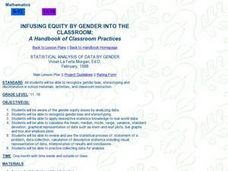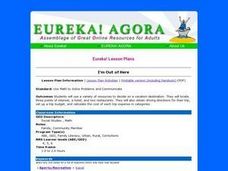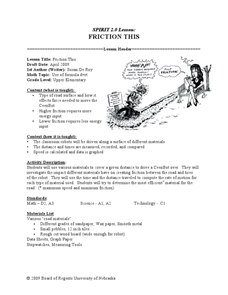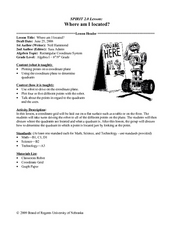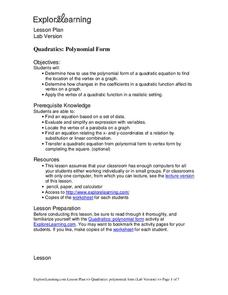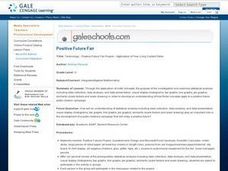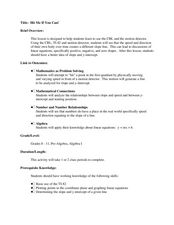Curated OER
Statistical Analysis of Data by Gender
Students examine and identify gender bias, stereotyping, and discrimination in school materials, activities, and classroom instruction. They apply descriptive statistics knowledge to real-world data.
Curated OER
A River Ran Through It
Students research how water is used to generate electricity. They investigate water's potential-to-kinetic energy transfer in hands-on activities about falling water and waterwheels. They take measurements, calculate averages and graph...
Curated OER
Planning My Vacation Online
Students use a variety of resources to decide on a vacation destination. They locate three points of interest, a hotel, and two restaurants at their destination.Students obtain driving directions for their trip, create a trip budget, and...
Curated OER
Book: Latinos Today: Facts and Figures
Students, after reading Chapter 1 in the book, "Latinos Today: Facts and Figures," identify and characterize the four main ethnic/racial groups in America. They calculate and design a bar graph showing their populations by their...
Curated OER
Specific Heat and Insulation
Students measure the air and soil temperatures at designated times. They graph the temperatures of each on one piece of graph paper with different colors. Students compare the information for the two line plots and analyze their results...
Curated OER
Friction This
Students investigate road surface and calculate speed. In this algebra lesson, students analyze the roughness of a road and calculate distance and speed based on friction. They relate friction and energy to speed.
Curated OER
Where am I Located
Students calculate and find a certain location. In this geometry instructional activity, students examine a coordinate plane for pair of coordinates. They calculate the distance between point using the distance formula and estimation.
Curated OER
"The Outsiders" by S.E. Hinton
Students estimate the distance in miles between Tulsa, Oklahoma and Manhattan, Kansas. They gather and graph data on gangs in both areas.
Curated OER
Investigating the Probability
Pupils investigate probability using coins and dice. They collect data, graph, organize and interpret data. They predict, describe, compare, compute and draw conclusions based on what they observe and record.
Curated OER
Disease Lesson
Ninth graders examine rates, matrices, histograms, line graphs, data analysis and data presentation in order to develop an understanding of how these concepts apply to a the effects of a specific disease.
Curated OER
Who Gave It to You?
Students use logic to locate the primary cases, the people who started the spread of the disease through the population. They graph the data of the number of people infected over time (exchanges) and determine an equation that best fits...
Curated OER
Quadratics: Polynomial Form
Students determine how to use the polynomial form of a quadratic equation to find the location of the vertex on a graph. They determine how changes in the coefficients in a quadratic function affect its vertex on a graph. Students find...
Curated OER
Testing the Waters
Eleventh graders examine a local body of water. In this science lesson, 11th graders collect water samples to test. Students analyze the data and make conclusions. Students create tables and graphs of the data.
Curated OER
Sunrise, Sunset: Quickly Go the Days
Learners explore the concept of daylight. In this daylight lesson, students compare the amount of daylight on a particular day in Anchorage compared with daylight where they live. Learners color maps of the US according to amount of...
Curated OER
Pump It Up
Young scholars study the anatomy and functions of a heart. For this heart study lesson, students read a book about the heart and study a plaster heart model. Young scholars take their own pulse in various stages of rest as well as active...
Curated OER
Positive Future Fair Project
Ninth graders view the film "Pay It Forward" and discuss what kind of public campaign is needed to move people to positive action. They consider different ways of presenting information (graphs, visual displays, etc.) as tools for...
Curated OER
Estimation of Population Growth by Counting Offspring: Seed Multiplication
Students analyze a multi-seeded fruit, such as tomato, pepper, squash, watermelon, etc. They remove and count the seeds from the fruit and hypothesize/calculate the reproductive rate of that organism.
Curated OER
What's a Per-"cent"?
Learners recognize the mathematical connections between fractions and percents. They develop and study graphs to make connections between their data and what it represents. They write about the connections they have discovered.
Curated OER
Cooking a Few of my Favorite Things
Second graders publish a class cookbook of their own recipes. They explore the nutritional value of foods, calculate the measurements, and prepare a healthy recipe for the class.
Curated OER
Exploring Equations and Y-Intercept
Students graph linear equations using intercepts, find y-intercept, find x-intercepts and graph linear equations that use horizontal and vertical lines.
Curated OER
Measuring and Predicting Capacity
Students investigate geometric shapes through volume and dimensions. In this geometry activity, students measure, weigh, and calculate sizes and volume based on estimation and calculation. They review important vocabulary related to...
Curated OER
Sun Path: Interactive On-line Mac or PC
Students use SunPath in the yearly mode to investigate seasonal changes in sunrise, sunset, length of day and sun altitude at their own latitude. Sun Path JAVA applet uses equations for a spherical Earth to calculate the sunrise and...
Curated OER
Hit Me If You Can!
Students graph linear equations using slopes and intercepts. In this algebra lesson, students identify the slope as being positive,negative or undefined. They differentiate between different quadrants on a coordinate plane.
Curated OER
Linking Algebra to Temperature
Students convert between two units as they calculate the temperature. In this algebra lesson, students collect data on seasonal climate and create a graph. They make conjectures based on their data collection.


